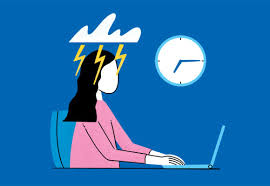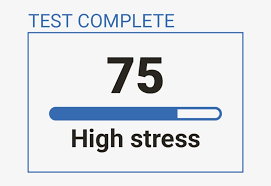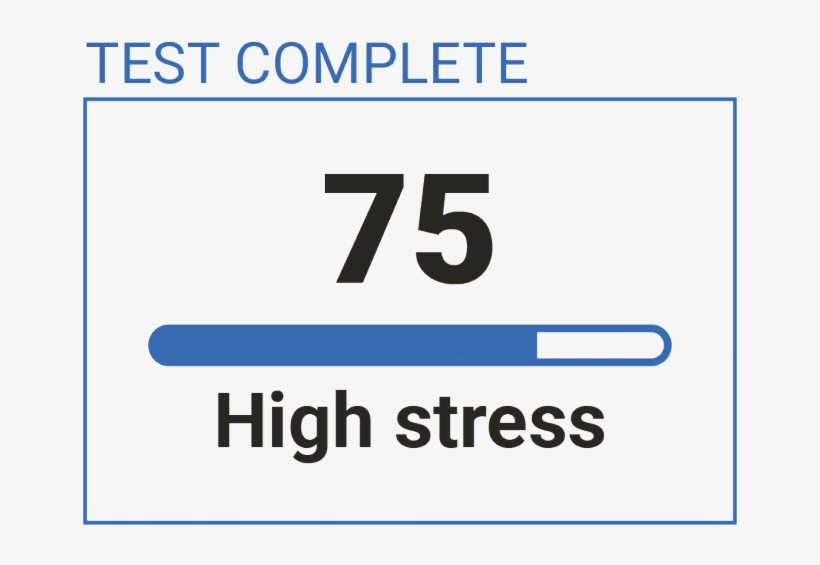Stress is a lot like an onion. The more you peel, the more layers you find. What starts as something seemingly simple (a new job) can grow into something much bigger (an inability to sleep). Even if we know what’s causing our stress and how to address it, sometimes the feeling of overwhelm takes over and we don’t know where or how to start. That’s why we created this Stress Level Test resource guide: To help take some of the guesswork out and make it easier for you to understand your stress levels, identify potential causes of your stress, and get started on some solutions!
Contents
- 1 Understanding Stress
- 2 Decoding The Stress Level Test
- 3 Types Of Stress Level Test
- 4 Questions To Ask Me Before Stress Level Test
- 5 The Procedure Of Stress Level Test
- 6 Sample Questions Of Stress Level Test
- 7 Result And Interpretation
- 8 Handling The Result
- 9 Stress FAQs
- 10 Conclusion
- 11 A Word From Therapy Mantra
Understanding Stress

What Is Stress?
The American Psychological Association (APA) defines stress as “a physical, emotional, or behavioral response to events that are perceived as threatening or challenging.” In other words, anything from the death of a loved one to getting stuck in traffic can cause us stress.
What Are The Types Of Stress?
There are three types of stress:
Acute stress: This is the type of stress we feel when we experience something sudden and intense, like getting into a car accident. Acute stress is usually temporary and goes away once the situation has passed.
Chronic stress: This is the type of stress that builds up over time and can last for months or even years. It’s often caused by ongoing problems or difficult situations, like a bad relationship or financial troubles.
Traumatic stress: This is the type of stress that we feel after experiencing something traumatic, like a natural disaster or violent attack. Traumatic stress can cause long-term problems and may require professional help to manage.
What Are The Degrees Of Stress?
There are three degrees of stress:
Low-level stress: This is the type of stress that feels manageable and doesn’t cause any major problems. It can help motivate us to achieve our goals, but if it lasts for a long time it can start to wear us down.
Moderate stress: This is the type of stress that feels challenging but manageable. It can cause some problems if it lasts for a long time like difficulty sleeping or eating, but usually, we’re still able to function normally.
High-level stress: This is the type of stress that feels overwhelming and causes major problems. It can lead to physical and emotional problems like anxiety and depression and can make it difficult to function normally.
What Are The Causes Of Stress?

Many different things can cause stress, but some of the most common include:
Work-related stress: This is the type of stress that we feel from our job or work-related activities. It can be caused by things like tight deadlines, difficult bosses or co-workers, or a heavy workload.
Family-related stress: This is the type of stress that we feel from our family life or relationships. It can be caused by things like arguments with loved ones, feeling overwhelmed by childcare responsibilities, or financial problems.
Health-related stress: This is the type of stress that we feel from our health or physical well-being. It can be caused by things like a serious illness, chronic pain, or disability.
Possible Ill Effects Of Stress
When stress is left unmanaged, it can lead to several physical and emotional problems like:
Physical problems: These can include things like headaches, stomachaches, chest pain, or dizziness.
Emotional problems: These can include things like anxiety, depression, anger issues, or relationship problems.
Decoding The Stress Level Test
What Is The Stress Level Test?
The Stress Level Test is a questionnaire that measures how stressed you feel at the moment. It’s made up of 18 questions (more or less) and takes about five minutes to complete.
What Information Do I Get From The Stress Level Test?
The Stress Level Test will give you a score between 0-100, with 100 being the most stressed. It will also give you a breakdown of your score, including how stressed you feel physical, emotionally, and mentally.
Why Should I Take The Stress Level Test?
There are many reasons why you might want to take the Stress Level Test. Some of the most common include:
- Measure your current level of stress
- See if your stress is causing any problems
- Get an idea of what type of stress you’re experiencing
- See if you need help managing your stress
When Should I Take The Stress Level Test?
The best time to take the Stress Level Test is when you’re feeling stressed out and want to measure how bad it is. You can also use it as a baseline to see how your stress changes over time.
How Does Stress Level Test Look Like?
The questions in the questionnaire are designed to measure your stress level. There are different types of stress, and the test will help you identify which type is causing you problems. The questionnaire will also ask about your general health, lifestyle, and mood.
How Accurate It Is?
The Stress Level Test is moderately accurate. It’s not meant to replace professional help, but it can give you a general idea of how stressed you are.
Types Of Stress Level Test
There are three different types of stress level tests:
The self-report questionnaire: This is the type of test that asks you to rate how stressed you feel on a scale. It’s the most common type of stress level test and is easy to administer.
The physiological measure: This is a test that measures things like heart rate, blood pressure, and cortisol levels. It’s more accurate than the self-report questionnaire, but it’s also more expensive and difficult to administer.
The observational measure: This is a test that asks someone else to rate how stressed you seem based on your behavior. It’s the most accurate type of stress level test, but it’s also the most expensive and difficult to administer.
Questions To Ask Me Before Stress Level Test
Before you take the stress level test, there are a few questions you should ask me:
- What is the stress level test?
- How does the stress level test work?
- What information will I get from the stress level test?
- Why do you suggest I take the stress? level test?
- When is the best time to take the stress level test?
- What type of stress level test should I choose?
- How accurate is the stress level test?
The Procedure Of Stress Level Test
Once you’ve decided which type of stress level test you want to take, the procedure is pretty simple:
Fill out the questionnaire: This will ask you a series of questions about how stressed you feel.
Submit your answers: Once you’ve finished the questionnaire, submit your answers and I’ll score them for you.
Get your results: I’ll give you a score between 0-100, along with a breakdown of how stressed you felt physically, emotionally, and mentally.
NOTE: If your score is high, don’t worry! There are many different treatments and therapies available that can help you reduce your stress level. Talking to a professional is the best thing to do, and they will be able to find the right treatment for you.
Sample Questions Of Stress Level Test
Below are some sample questions from the stress level test.
- How stressed do you feel right now? On a scale of 0-100, how stressed do you feel at this moment?
- Are you feeling physical symptoms of stress such as headaches, stomachaches, chest pain, or dizziness? Check all that apply.
- How much has stress interfered with your work or home life in the past month?
- How often do you feel overwhelmed or out of control due to stress?
Types Of Stress Level Test Questions
Before you take the Stress Level Test, it’s important to understand what types of questions it will ask. The questionnaire is designed to measure how stressed you feel in three different areas: physical, emotional, and mental.
The Physical Section: This section asks about your physical symptoms of stress like headaches, neck pain, and stomach problems.
The Emotional Section: This section asks about your emotional symptoms of stress like feeling overwhelmed, frustrated, or angry.
The Mental Section: This section asks about your mental symptoms of stress like difficulty concentrating, worrying a lot, and feeling nervous.
Result And Interpretation
 Once you’ve taken the stress level test, you’ll get a score that corresponds to one of the following four levels:
Once you’ve taken the stress level test, you’ll get a score that corresponds to one of the following four levels:
Stressed: If your score is between 30 and 39, you’re considered to be stressed. This is because your body is in a state of fight-or-flight and you’re likely feeling anxious, overwhelmed, and exhausted.
Severely Stressed: If your score is between 40 and 49, you’re considered to be severely stressed. This means that your stress levels are high enough to cause major problems in your life like physical or emotional health issues, difficulty functioning at work or school, or relationship problems.
Traumatized: If your score is 50 or higher, you’re considered to be traumatized. This means that you’ve experienced a traumatic event and are likely dealing with ongoing problems as a result. If this is the case, it’s important to seek professional help.
Summary
A score between:
- 0-30 means you’re not very stressed
- 31-50 means you’re moderately stressed
- 51-70 means you’re severely stressed
- A score of 71 or higher means you’re extremely stressed
Handling The Result
Once you’ve gotten your score, it’s important to take action. This might mean seeking professional help, making changes to your lifestyle, or talking to a friend or family member about your stress.
Talking To A Professional
If you’re feeling overwhelmed by your stress level, talking to a professional is the best thing to do. There are many different types of professionals who can help, like therapists, counselors, or psychologists.
Treatment And Therapies
 There are many different treatments and therapies available for people who are stressed. Some of these include:
There are many different treatments and therapies available for people who are stressed. Some of these include:
Yoga: Yoga is a type of exercise that combines stretching and relaxation. It can help to reduce stress and improve your mood.
Massage: Massage can help to reduce stress and tension in your muscles. It can also be relaxing and calming.
Acupuncture or acupressure: Acupuncture is a type of therapy that uses needles to stimulate specific points on the body. Acupressure is a similar treatment that uses pressure instead of needles.
Talk therapy: Talk therapy is a type of counseling that helps you deal with your problems and emotions. It can be done in person or over the phone/internet.
Cognitive-behavioral therapy: Cognitive-behavioral therapy is a type of talk therapy that helps you change the way you think and behave. This can help to reduce stress levels.
Mindfulness meditation: Mindfulness meditation is a type of meditation that teaches you how to focus on the present moment. This can help to reduce stress and anxiety.
Self-care: Self-care is the practice of taking care of yourself. This can include things like getting enough sleep, eating healthy foods, and exercising.
Medication: If your stress is caused by a mental illness, you might need medication to help you get better. There are many different types of medications available, and your doctor will be able to find the best one for you. Such as:
- Benzodiazepines: Benzodiazepines are a type of medication that helps to reduce anxiety.
- Antidepressants: Antidepressants are a type of medication that helps to improve mood.
- Beta-blockers: Beta-blockers are a type of medication that helps to control the physical symptoms of stress.
Case Study

Mary is a 26-year-old woman who works as a nurse. She’s been feeling stressed out at work lately because she’s been dealing with a lot of difficult patients. Her stress level test score was 39, which means she’s considered to be stressed.
Mary decides to see a therapist to help her deal with her stress. The therapist helps her identify the sources of her stress and teaches her some relaxation techniques. After a few sessions, Mary feels much better and can manage her stress better.
Stress FAQs
Q: What is the difference between stress and anxiety?
A: Stress is a feeling of tension or anxiety that can be caused by difficult events or situations. Anxiety is a type of mental illness that causes feelings of worry, fear, and panic.
Q: I’m having trouble sleeping. Is this a symptom of stress?
A: Yes, insomnia can be a symptom of stress. Other symptoms include headaches, muscle tension, and fatigue.
Q: What is the best way to deal with stress?
A: There is no one-size-fits-all answer to this question. Some people find relaxation techniques helpful, while others might need medication or therapy. Talk to your doctor to find the best way to deal with your stress.
Q: I’m feeling overwhelmed. Should I take a stress level test?
A: If you’re feeling overwhelmed, it might be a good idea to take a stress level test. A high score on the test could mean that you’re dealing with too much stress and might need help to manage it.
Q: Is stress bad for me?
A: Yes, too much stress can be harmful to your physical and mental health. It can cause problems like headaches, muscle tension, anxiety, and depression. It’s important to find ways to manage your stress so that it doesn’t hurt your life.
Conclusion
Stress can be a normal part of life, but if it’s left unmanaged, it can cause serious health problems. That’s why it’s important to know your stress level and take steps to manage it. There are many different ways to reduce stress, and the best one for you will depend on your individual needs. If you’re feeling overwhelmed, it might be a good idea to take a stress level test. talk to your doctor about how to best manage your stress.
A Word From Therapy Mantra
Your mental health — Your psychological, emotional, and social well-being — has an impact on every aspect of your life. Positive mental health essentially allows you to effectively deal with life’s everyday challenges.
At TherapyMantra, we have a team of therapists who provide affordable online therapy to assist you with issues such as depression, anxiety, stress, workplace Issues, addiction, relationship, OCD, LGBTQ, and PTSD. You can book a free therapy or download our free Android or iOS app.


